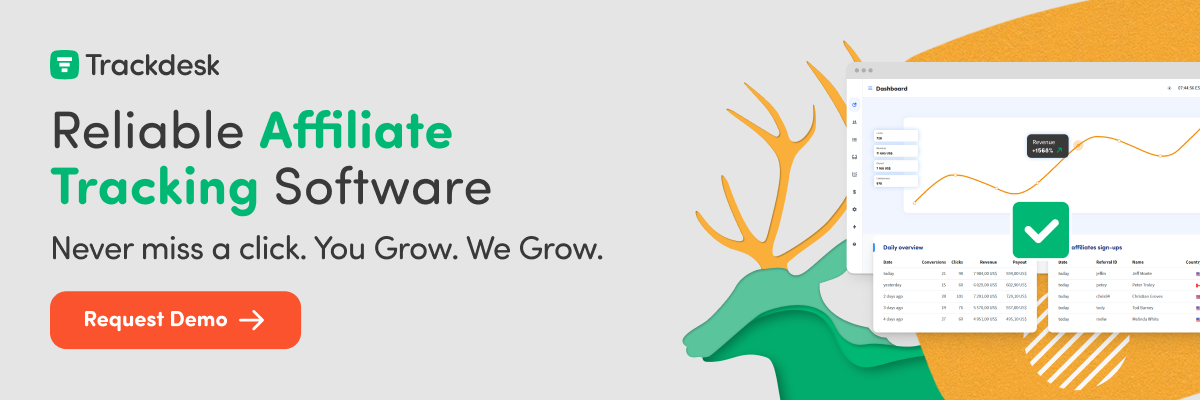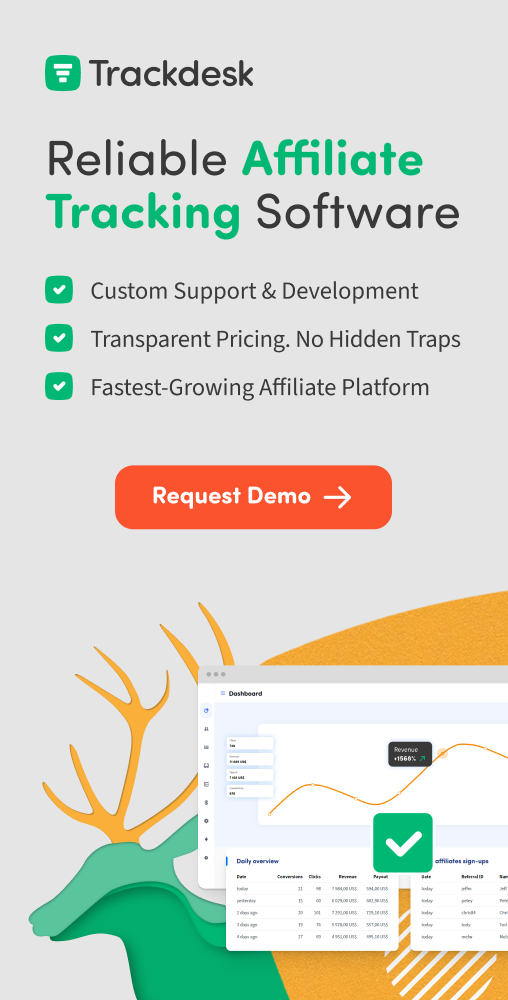
8 Steps to Create an Affiliate Landing Page
Learn how to make a high-converting affiliate marketing landing page with this step-by-step guide that includes practical examples with helpful pointers.
A landing page is one of the most critical pages in a website. It’s only one page long but can make or break your affiliate marketing program. On this page, you convince site visitors to sign up and become active publishers. A well-designed affiliate landing page will convert many promising leads and catapult your program to success.
On average, landing pages have a 5.89% conversion rate. This is pretty low, considering the 10% benchmark for a good landing page conversion rate.
So, how do you design a high-converting landing page? We discuss the basics below and give tips to optimise your page further.
How to Create a Landing Page for Affiliate Marketing
Building a landing page may seem tough, but don’t be intimidated. It’s easier than you think. Here are several key steps to ensure you create an effective landing page.
-
Define your value proposition.
Before you start thinking about the colours or the placement of website elements, you must be clear about the unique value your program offers. There are a lot of affiliate programs out there, so you must define how yours differ.
Your affiliate landing page must highlight the benefits of your program, such as your commission rates, winning products, and exclusive perks. You must show what sets you apart and why prospects should consider your program.
-
Choose the right tool.
You don’t need to be a developer to build a landing page (or even a website). There are a lot of reliable landing page builders that will suit your needs and help you quickly create beautiful and effective pages. Since most of them are no-code, like the drag-n-drop builder from SendPulse, anyone can use them, because the process is visual from start to finish.
Make sure that your tool integrates seamlessly with your affiliate tracking and analytics platform. trackdesk uses Zapier to help you connect to over 6,000 apps and automate your workflows. This includes popular landing page builders so you can quickly capture leads and manage them from within your trackdesk dashboard. If you need help with any integration, our support team is more than happy to help.
-
Craft compelling content
Getting your leads to click and land on your page is winning half the battle. Once they’re on your site, you need to keep them engaged and prevent them from bouncing off. Start by creating clear and concise headlines that convey the main message. Use persuasive and benefit-driven language in your copy.
Don’t overwhelm your visitors by cramming too much information in a single page. Instead, break them down into digestible sections using bullet points and subheadings. Focus on the unique selling points of your program and its benefits to the reader.
Creating engaging content is crucial for your campaign’s success. However, finding affiliates who can come up with captivating content may seem like a tough challenge. With trackdesk’s Partnership Managers Marketplace, you can connect with experienced partnership managers who can help you find and connect with the right affiliate partners. Get full control of your affiliate marketing program and build a proprietary affiliate pool with trackdesk’s Partnership Managers Marketplace. Connect with world-class talent today.
-
Add social proof
People resonate with others who have tried and succeeded in their identified path. Your prospective affiliates are the same. They’re looking for those who have tried your program and become successful. As such, incorporate testimonials and reviews to build trust.
If you have popular and successful affiliates in your pool, ask them for testimonials that you can display on your page. Highlight the positive experiences of your program and, if you can, show how much existing affiliates earn. Knowing that others can make it with your program will speak volumes about the success potential that prospects can also enjoy.
-
Use great visuals
Images and videos will always be louder than words. As visitors scroll through your page, they won’t read all the words written, but they’ll glance at the images and play a few seconds of your videos. Use these media strategically throughout your page to convey your message. If you're working with low-quality visuals, consider tools that can unpixelate images to enhance clarity and maintain a professional look.
Go for images and videos that evoke emotion and resonate with your target audience. Make sure they align with your overall branding and messaging and convey your brand identity, which includes your cool logo as well.
-
Have a clear CTA
Guide your visitors to one clear desired action, such as completing a signup form. Place your call-to-action (CTA) in various prominent and visually appealing locations throughout your page, and use action-oriented text on your buttons.
Don’t bury your CTA at the bottom of the page. Instead, introduce it right at the start, ideally above the fold. Towards the middle of the page, include another CTA, and of course, put the CTA again at the end. Find the perfect balance of having enough CTAs without being too pushy.
-
Link your signup form
Once everything’s ready, it’s time to link your signup form. trackdesk provides a user-friendly signup form that you can securely link to your landing page. You can customise this affiliate registration form with relevant fields so you can streamline the signup process.
You can also introduce custom questions so you can further gather information about the person, which will be useful in evaluating if they’re fit for your program. You can share additional information or instructions by adding a text block on top of the form.
-
Test your landing page
Before directing traffic to your landing page, test it first. Check that CTAs are working and the signup form is properly linked. After the launch, make sure to test the page periodically to ensure it remains optimised. Good user experience highly impacts its conversion rate. Periodical testing using UX (user experience) testing tools such as UXtweak can ensure it remains optimised. You can also conduct an A/B test (or split testing) to see if there are better CTA copies, colours, elements, etc. Track the page's performance over time and update it as necessary to improve its
By following these steps, you can create a well-optimised affiliate marketing landing page that effectively communicates your value proposition, engages visitors, and encourages them to take the desired action.
Tips to Optimise Your Affiliate Landing Page
Here are further tips to ensure you have a high-converting affiliate marketing landing page.
- Avoid too many navigation links. This will limit distractions and help visitors focus on your key message. If possible, use only one or two navigation links. You want to streamline the user experience so that visitors only have one goal (or one link) to click – your CTA.
- Offer free value. Don’t just sell your program to your visitors. Provide information or resources that would genuinely benefit them, such as a downloadable guide or exclusive content. You want to establish trust and goodwill at the onset so they’ll be more likely to respond positively to your program.
- Use a sleek and simple design. A clutter-free layout enhances user experience and ensures visitors can quickly grasp the key information. Choose a simple colour scheme and use whitespace strategically to guide the visitor’s focus. Ensure the design complements your brand identity while maintaining a professional aesthetic. In this stage, examining a detailed web design guide can provide valuable insights and best practices to refine your design approach.
- Create an engaging title. Craft a headline that grabs the reader’s attention. The title sets the tone of the entire landing page and entices visitors to explore further. It should create a sense of curiosity and encourage visitors to delve into the content to discover more information about the affiliate program.
By incorporating these tips as you build your affiliate landing page, you can create a more focused, user-friendly, and persuasive experience for visitors. Your goal is to guide them from the initial engagement to the desired action.
Examples of great affiliate landing pages
Let’s take a look at the following examples of affiliate marketing landing pages and what you can learn from them.
trackdesk

https://trackdesk.com/affiliate-program
First on the list is our very own affiliate program landing page. There are great things here, but there are also points for improvement.
Positives:
- The benefit – lifetime recurring revenue – is highlighted right at the beginning. It also clearly shows how much commission an affiliate can earn and the frequency of payouts. For many affiliates, these are the basic information they need to decide on a program.
- CTAs are clear and shown above the fold. After reading the benefits, you’d know exactly what to do. CTAs are also incorporated in the middle and towards the end of the page.
- If you move further down, there’s an expanded explanation of what’s in it for the affiliate. It’s comprehensive yet not overwhelming since subheadings, visuals, and whitespace are used to make the information digestible.
- We’ve also included 3 simple steps to guide readers on what to do after they’ve decided they want to join the program. There’s also information about the right type of person who’d make an ideal affiliate.
- In case the visitor is still doubtful, there’s a section with a testimonial and links to reviews of the app. This encourages them that they’ll be promoting a stellar product.
- And finally, in case there are further questions, we’ve provided an FAQ section to guide readers.
Points for Improvement:
- We can reduce the number of navigation links by removing the top main navigation for this page. This will force readers to perform only one set of actions – Sign Up or Login.
- We can expand the testimonial section with more positive reviews from trackdesk clients or affiliates.
Shopify

https://www.shopify.com/affiliates
Shopify is a leading e-commerce platform that helps small businesses and large enterprises build their own online store. They also have an affiliate program where they reward affiliates for every successful signup.
Positives:
- The page isn’t cluttered with navigation links, and there’s only one CTA – Apply now.
- They evoke emotion from the visitor by encouraging you to help people become entrepreneurs. This adds a social dimension to the usual affiliate goal of earning commissions.
- Subheadings and short texts are used throughout the page. Whitespace is heavily implemented, creating a streamlined and minimalist look.
- A huge section on social proof shows the different successful Shopify affiliates. These are video testimonials where you can learn how they became successful.
- There’s an FAQ at the bottom providing more information.
Points for Improvement:
- Affiliates are still concerned about the tangible benefits of your program, such as your commission structure. Shopify hides this information in the FAQs, not making it part of the main copies.
monday.com

https://monday.com/affiliate-program
monday.com is a project management SaaS tool that helps teams organise their work and get more things done. It has a vibrant affiliate marketing program with a dedicated landing page.
The Positives:
- There’s only one CTA and zero navigation links. Visitors only have one thing to do on the website: earn rewards. The text used is also unique instead of the typical “Apply Now.”
- They don’t waste words explaining their program and proceed right away to explain how you can join and earn. The commission structure and the pay-out process are explained clearly.
- The design is very clean and sleek.
Points for improvement:
- A better contrasting colour could be used for the CTA button. Or they could make the text easier to read.
- They could include a social proof section with customer reviews of the product or affiliate testimonials.
- They can use more visually stunning graphics or photos to make the page appear more professional.
There’s no perfect affiliate marketing landing page as what these great brands have shown. What’s important is you follow the basics and optimise along the way. Always keep your target audience’s interest in mind and create a page to help them decide if your program is the right fit for them.
If you need further guidance creating an affiliate landing page, check out our Partnership Managers Marketplace. We have the top talents in affiliate marketing who can help manage and scale your affiliate program.
Final Thoughts
Affiliate marketing involves a lot of moving parts, and there are a ton of action items you must complete to ensure a successful program. The landing page is just one of them, and with the steps, tips, and examples above, you can create the ideal page for your program.
With a world-class tool like trackdesk, you can launch and manage a winning affiliate program that rewards your business and publishers.

I have a passion for storytelling. I believe that a good story delivers value while capturing, influencing, and sustaining its intended audience. This has always been, and always will be, my primary aim as a writer.


